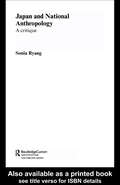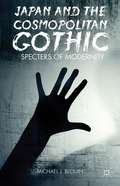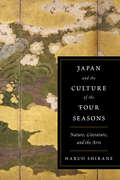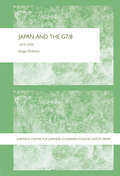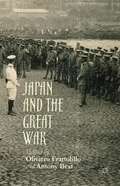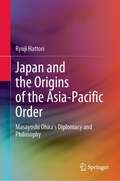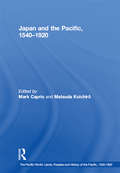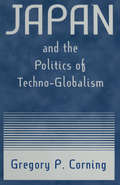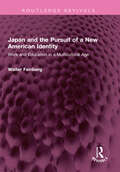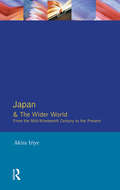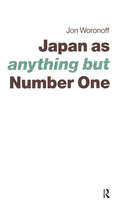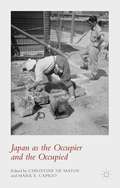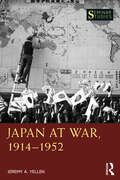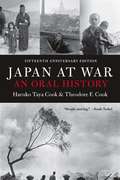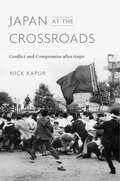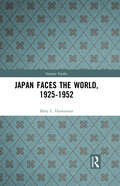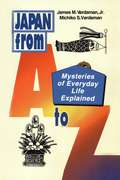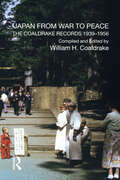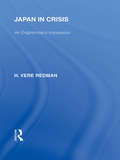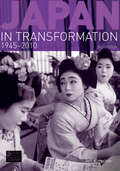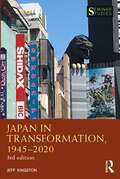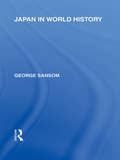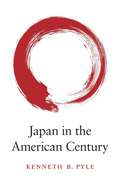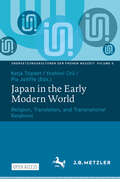- Table View
- List View
Japan and National Anthropology: A Critique (Routledge/Asian Studies Association of Australia (ASAA) East Asian Series #Vol. 6)
by Sonia RyangJapan and National Anthropology: A Critique is an empirically rich and theoretically sophisticated study which challenges the conventional view of Japanese studies in general and the Anglophone anthropological writings on Japan in particular. Sonia Ryang explores the process by which the postwar anthropology of Japan has come to be dominated by certain conceptual and methodological and exposes the extent to which this process has occluded our view of Japan.
Japan and the Cosmopolitan Gothic
by Michael J. BlouinJapan is imagined routinely in American discourse as a supernatural entity. Gothic tales from these two cultures have been exchanged, consumed, and adapted. Here, Blouin examines a prevalent tendency within the United States-Japan cultural relationship to project anxiety outward only to find shadowy outlines of the self abroad.
Japan and the Culture of the Four Seasons: Nature, Literature, and the Arts
by Haruo ShiraneElegant representations of nature and the four seasons populate a wide range of Japanese genres and media—from poetry and screen painting to tea ceremonies, flower arrangements, and annual observances. In Japan and the Culture of the Four Seasons, Haruo Shirane shows how, when, and why this practice developed and explicates the richly encoded social, religious, and political meanings of this imagery. Refuting the belief that this tradition reflects Japan's agrarian origins and supposedly mild climate, Shirane traces the establishment of seasonal topics to the poetry composed by the urban nobility in the eighth century. After becoming highly codified and influencing visual arts in the tenth and eleventh centuries, the seasonal topics and their cultural associations evolved and spread to other genres, eventually settling in the popular culture of the early modern period. Contrasted with the elegant images of nature derived from court poetry was the agrarian view of nature based on rural life. The two landscapes began to intersect in the medieval period, creating a complex, layered web of competing associations. Shirane discusses a wide array of representations of nature and the four seasons in many genres, originating in both the urban and rural perspective: textual (poetry, chronicles, tales), cultivated (gardens, flower arrangement), material (kimonos, screens), performative (noh, festivals), and gastronomic (tea ceremony, food rituals). He reveals how this kind of "secondary nature," which flourished in Japan's urban architecture and gardens, fostered and idealized a sense of harmony with the natural world just at the moment it was disappearing. Illuminating the deeper meaning behind Japanese aesthetics and artifacts, Shirane clarifies the use of natural images and seasonal topics and the changes in their cultural associations and function across history, genre, and community over more than a millennium. In this fascinating book, the four seasons are revealed to be as much a cultural construction as a reflection of the physical world.
Japan and the G7/8: 1975-2002 (The University of Sheffield/Routledge Japanese Studies Series)
by Hugo DobsonThis book analyses Japan's international relations and participation in the multilateral forum, the G8, since its creation in 1975. The author explores the motivation of the Japanese government and non-governmental actor's aims and objectives and examines how and to what extent they have been achieved. Presenting a wealth of new research this theoretically informed book will be of interest to those studying interntional relations and Japanese politics.
Japan and the Great War
by Antony Best Oliviero FrattolilloIn this book, seven internationally renowned experts on Japanese and Asian history have come together to investigate, with innovative methodological approaches, various aspects of the Japanese experience during and after the First World War.
Japan and the Origins of the Asia-Pacific Order: Masayoshi Ohira's Diplomacy and Philosophy
by Ryuji HattoriThis book analyzes Ohira's ideology, philosophy, and actions as a politician and a minister, based on primary sources from Japan and the USA, and makes a significant contribution to the field of Japanese political and diplomatic history. This book is the first critical biography to chart Masayoshi Ohira’s life and work, with a focus on his political philosophy, and how he sought to create a new order in the Asia-Pacific region, framing a plan for solidarity across the Pacific Rim. If a statesman is a politician who has made diplomacy their life's work, then Ohira can be regarded as the first Japanese statesman of the modern era. While this ambition remained unfulfilled, Ohira's involvement in foreign policy was long and intensive—and highly influential—on the region. One of only two postwar prime ministers to have served as foreign minister for two terms, he attempted to balance the pursuit of a new order in the Pacific Rim with Asian diplomacy and focused on cooperation with the USA without becoming overly reliant on it. With the new availability of original documents decades after his death, this book has become possible, enabling the author to systematically follow and record Ohira's diplomatic vision. Combining history, political philosophy, political science, and international relations, this book is of appeal to history scholars and students of Japan, as well as of the foreign relations of countries such as the USA, China, and Korea.
Japan and the Pacific, 1540–1920: Threat and Opportunity (The Pacific World: Lands, Peoples and History of the Pacific, 1500-1900 #10)
by Matsuda KoichiroThis volume seeks to capture the rich array of images that define Japan's encounters with the Pacific Ocean. Contemporary Japanese most readily associate 'Pacific' with the devastating war that their country fought over a half century ago. The ensuing occupation realized a situation that this people had striven to avoid ever since the Portuguese first arrived in 1543 - their subjugation by a foreign power. But the Pacific Ocean also extended Japan's overseas contacts. From antiquity Japanese and their neighbours crossed it to trade ideas and products. From the mid-16th century it carried people from more distant lands, Europe and America, and thus expanded and diversified Japan's cultural and economic exchange networks. From the late 19th century it provided the highway to transport Japanese imperial expansion in Northeast Asia and later to encourage overseas migration into the Pacific and the Americas. The studies selected for inclusion in this volume, along with the introduction, explain how the Pacific Ocean thus nurtured images of both threat and opportunity to the island nation that it surrounds.
Japan and the Politics of Techno-globalism
by Gregory P. Corning"Techno-globalism" is the term used by policymakers to describe the process of opening government and Research and Development programs to foreign participation. This book focuses on Japan's approach to techno-globalism, in particular the policies of the Ministry of International Trade and Industry (MITI). It also explores the politics underlying the approach to this issue in the triad of leading R&D centers - Japan, the United States, and the European Union. The author examines various theoretical approaches to the political economy of globalization, and he describes systems of innovation in Japan, the United States, and the European Union, emphasizing research linkages among forms, national labs, and universities.
Japan and the Pursuit of a New American Identity: Work and Education in a Multicultural Age (Routledge Revivals)
by Walter FeinbergFirst published in 1993, Japan and the Pursuit of a New American Identity is a sophisticated analysis of the mission of education in a multicultural age. Arguing that American education has been too long constrained by conservative discourse – which positions schools and students as weapons in an international competition with the Japanese – author Walter Feinberg assesses the cultural and philosophical limits of conservative vision as popularized by exponents Allan Bloom and E. D. Hirsch. Feinberg then develops a vision of education which accommodates the growing cultural diversity of American society and American schools. At the heart of Feinberg’s study is a unique philosophical analysis of Japanese and American attitudes towards work and education. Through a series of sensitively developed interview with American and Japanese workers, managers, parents, and teachers who have experienced life in one another’s culture, he examines the implications of our profound cultural differences with the Japanese for the development of a new American, multicultural identity. This book will be of interest to students of education, pedagogy, history and public policy.
Japan and the Wider World: From the Mid-Nineteenth Century to the Present
by Akira IriyeAkira Iriye assesses Japan's international relations, from a Japanese perspective, in the century and a half since she ended her self-imposed isolation and resumed her place in the international community. The book is the author's own adaptation of two highly successful short studies, up to and after 1945, that he wrote for Japan. It ends with a consideration of Japan's international relations since the end of the Cold War, and her place in the world today. This is history written from within - and there could be no better interpreter of Japan to the West than this most distinguished of historians, who, himself Japanese, has long lived and taught in the United States.
Japan as (Anything but) Number One
by WoronoffA full scale examination of the 1979 Sino-Vietnamese War - the events that led to it, the Cold War aftermath, and the implications for the region and beyond.
Japan as the Occupier and the Occupied
by Christine De Matos Mark E. CaprioThe moment of Japan's defeat in 1945 artificially dissects its history. Not long after the Meiji Restoration, Japan acquired Ezo (present-day Hokkaido) and the Ryukyu Islands (present-day Okinawa). Later in the Meiji Period it annexed Taiwan, southern Sakhalin, and the Korean peninsula. Before the Asia-Pacific War ended in 1945, Japan controlled territories in China, Manchuria, Southeast Asia and the Pacific but with its acceptance of the Potsdam Declaration in August 1945, Japan lost mostof these acquisitions. Examining issues and experiences as part of either a prewar/wartime or postwar context impedes our ability to understand the influence that one period had on the other. How do occupiers maintain their position of power and influence over the people of the state it occupies? How did Japan's leadership and people manage the transition from that of occupier of other territories to that of being occupied by foreign powers? How did this transition affect different aspects of society, from the civilian to the military, the political to the bureaucratic? How did Japanese occupation affect those it had power over, from dissenters to collaborators? What long term impacts did military occupation have on the occupied in terms of memory, commemoration and repatriation? Japan as the Occupier and the Occupied investigates these types of questions by examining transwar transitions in Japan proper and the various territories that it controlled, including Korea, Borneo, Singapore, Manchuria and China. Through taking this approach, a more nuanced understanding of Japan's role as occupier and occupied emerges. More generally, the book contributes to scholarship on the power dynamics of military occupation and the complexities that emerge during, and in the aftermath of, imperial and military expansion, control, and retreat.
Japan at War, 1914–1952 (Seminar Studies)
by Jeremy A. YellenJapan at War, 1914–1952 is a synthetic and interpretive history that highlights the centrality of war to the modern Japanese experience.The author argues that war was central to Japanese life in this period—the era when Japan rose and fell as a world power. The volume examines how World War I set off profound changes that led to the rise of a politicized military, aggressive imperial expansion, and the militarization of Japanese social, political, and economic life. War was extraordinarily popular, which helped confirm Japan’s aggressive imperialism in the 1930s and war across the Asia-Pacific in the 1940s. It took a defeat by 1945 and occupation through 1952 to undo war as a national concern and to remake Japan into a peaceful nation-state. In telling this story of Japan in war and peace, this book highlights the importance of Japan in the creation of the modern world.This study of political power and its influences in domestic and foreign affairs will be of great value to nonspecialist readers who are interested in this period, undergraduate and postgraduate students in introductory classes, and scholars interested in Japanese history and political, military, and international history.
Japan at War: An Oral History
by Haruko Taya Cook Theodore F. CookFollowing the release of Clint Eastwood's epic film Letters from Iwo Jima, which was nominated for the Oscar for Best Picture, there has been a renewed fascination and interest in the Japanese perspective on World War II. This pathbreaking work of oral history is the first book ever to capture--in either Japanese or English--the experience of ordinary Japanese people during the war. In a sweeping panorama, Haruko Taya Cook and Theodore F. Cook take us from the Japanese attacks on China in the 1930s to the Japanese home front during the inhuman raids on Tokyo, Hiroshima, and Nagasaki, offering the first glimpses of how the twentieth century's most deadly conflict affected the lives of the Japanese population. The book "seeks out the true feelings of the wartime generation [and] illuminates the contradictions between the official views of the war and living testimony" (Yomiuri Shimbun, Japan). Japan at War is a book to which Americans and Japanese will continue to turn for decades to come. With more than 30,000 copies sold to date, this edition features an updated cover designed to appeal to a new generation of readers.
Japan at the Crossroads: Conflict and Compromise after Anpo
by Nick KapurIn 1960, when Japan revised the postwar treaty that allows a U.S. military presence in Japan, the popular backlash changed the evolution of Japan’s politics and culture, and its global role. Nick Kapur’s analysis helps resolve Japan’s essential paradox as being innovative yet regressive, flexible yet resistant, imaginative yet wedded to tradition.
Japan faces the World, 1925-1952 (Seminar Studies)
by Mary L. HannemanBy 1925 the process of Japan's transition to a modern industrialised, westernised state was pretty much complete. Not only had the imperial tradition been restored with the Meiji Restoration in 1868, but some forms of democratic parliamentary institutions had been set up. However, during the years that followed, the so-called imperial democracy came under pressure as the Japanese sought to impose tight control over not only their own people but their neighbours as well. This impressive survey looks at developments at home, Japan's aggressive foreign policy particularly in China during the 1930s and 1940s, and her role in the Second World War. Finally, the post-war reconstruction orchestrated by the Americans is examined. The cut-off point is 1952 - the date when Allied Occupation formally came to an end and Japan once again became independent.
Japan faces the World, 1925-1952 (Seminar Studies)
by Mary L. HannemanBy 1925 the process of Japan's transition to a modern industrialised, westernised state was pretty much complete. Not only had the imperial tradition been restored with the Meiji Restoration in 1868, but some forms of democratic parliamentary institutions had been set up. However, during the years that followed, the so-called imperial democracy came under pressure as the Japanese sought to impose tight control over not only their own people but their neighbours as well. This impressive survey looks at developments at home, Japan's aggressive foreign policy particularly in China during the 1930s and 1940s, and her role in the Second World War. Finally, the post-war reconstruction orchestrated by the Americans is examined. The cut-off point is 1952 - the date when Allied Occupation formally came to an end and Japan once again became independent.
Japan from A to Z: Mysteries of Everyday Life Explained
by Michiko Sasaki Vardaman James M. VardamanThis Japanese travel guide provides goes beyond the typical guidebook, revealing the underlying cultural and historical reasons for the behavior and attitudes of The Japanese.<P><P>Authors Michiko and James Vardaman identify nearly three hundred aspects of Japanese culture, custom, and daily life that commonly frustrate, delight, or just plain stump non-Japanese. For each topic, they provide historical and other background that helps strip away some of the mystery surrounding Japanese culture, and make inscrutable Japan a little more scrutable. Drawings and illustrations help illustrate some objects that may be unfamiliar to Westerns, such as "New Year's rakes," Japanese water sprites, and wish tablets.Japan from A to Z fills in holes left by more academically oriented books on Japan by providing information on topics that readers would be unable to find in more staid, conventional sources. Fun and fascinating for tourist and resident alike, it offers a concise, readable introduction to the country and its way of life.
Japan from War to Peace: The Coaldrake Records 1939-1956
by William H. CoaldrakeThis book makes available for the first time a treasure trove of hitherto unpublished documents on Japan in the war years and immediate postwar occupation and recovery. The documents consist of newsletters, newspaper articles, texts of radio broadcasts and letters written by Frank William Coaldrake, a pacifist and priest and the first Australian civilian to enter Japan after the war, with his wife Maida. Frank and Maida formed a team of participant observers in the challenge of a nation confronting its past and trying to find hope in a future while occupied by foreign powers. This is a rare and comprehensive collection of first hand accounts of Japan by two astute observers. The daily struggle against starvation is interspersed with issues such as war atrocities, the atomic bombings, the status of the Imperial Family, the British monarch and labour unions. The text is illustrated with photographs taken by Frank Coaldrake. With an introduction by William H. Coaldrake, son of the authors.
Japan in Crisis: An Englishman's Impression (Routledge Library Editions: Japan)
by Hugh Vere Redman"...The Japanese are not so black as they are painted or so immaculate as they occasionally paint themselves." As the author’s own words suggest, this book attempts to give a balanced account of Japan during the "crisis" years of 1931-1935 which were some of the most significant in modern Japanese history. They saw an act of political expansion unique in the years following World War One, as well as an expansion of Japanese foreign trade in markets hitherto dominated by the exports of other countries. The letters re-issued here were written for both the Western and Japanese reader and as such represent an unrivalled impartial resource.
Japan in Transformation, 1945-2010 (Seminar Studies)
by Jeff KingstonSince 1945, Japan has successfully reinvented itself, rising from the ashes of defeat to become a peaceful and prosperous nation. It is seen as an inspiration for other developing nations and contributes significantly to global development. As the third largest economy in the world, with a reputation for technological innovation and cultural creativity, Japan is a country shaping the world we live in. In this new edition of Japan in Transformation, Jeffrey Kingston explores the character of the nation as it has evolved since the end of the Second World War. The book: - examines the US Occupation and explains the causes of the economic miracle and its demise- evaluates the effect of the Lost Decade of the 1990s and the unravelling of the Japan, Inc system that prevailed in the twentieth century- analyses such central and topical issues as the demographic crisis, regional relations, security concerns, political change and the role of women Expanded and thoroughly revised to cover the period of 1945 to 2010, this second edition of Japan in Transformation provides a succinct and comprehensive study of the recent history of one of the most dynamic nations in the modern world.
Japan in Transformation, 1945–2020 (Seminar Studies)
by Jeff KingstonJapan in Transformation, 1945–2020 has been newly revised and updated to examine the 3.11 natural and nuclear disasters, Emperor Akihito’s abdication, Prime Minister Shinzo Abe’s legacies, the 2019 World Cup and the postponement of the 2020 Tokyo Olympics due to COVID-19. Through a chronological approach, this volume traces the development of Japan’s history from the US Occupation in 1945 to the political consequences of the coronavirus pandemic. It evaluates the impact of the Lost Decade of the 1990s as well as key issues such as the demographic crisis, war memory, regional relations, security concerns, constitutional revision and political stagnation. In response to post-2010 developments such as Abenomics, the demise of the Democratic Party of Japan and immigration policy, chapters have been reassessed to account for changes in politics, the role of women, Japan’s relationships with Asia and how and why policies have fallen short of stated goals. Overall, the volume reveals how Japan transformed into one of the largest economic and technological powers of the modern world. With a Chronology, Who’s who and Glossary, this edition is the ideal resource for all students interested in Japanese politics, economy and society since the end of World War II.
Japan in World History (Routledge Library Editions: Japan)
by George SansomIn this volume the author considers what the purpose and method of advanced Japanese studies should be. He believes that the study of Japanese history should be, not an end in itself but an integral part of world history. He discusses areas of controversy in interpretation which arise when a comparative method is used and Japanese history is examined in correlation with world history.
Japan in the American Century
by Kenneth B. PyleNo nation was more deeply affected by America’s rise to power than Japan. The price paid to end the most intrusive reconstruction of a nation in modern history was a cold war alliance with the U.S. that ensured American dominance in the region. Kenneth Pyle offers a thoughtful history of this relationship at a time when the alliance is changing.
Japan in the Early Modern World: Religion, Translation, and Transnational Relations (Übersetzungskulturen der Frühen Neuzeit #5)
by Pia Jolliffe Katja Triplett Yoshimi OriiOpen Access. Early modern transnational relations and personal encounters were influenced by interactions between Japan and the regions that had become connected to it through expanding global trade and missionary networks. Translation activities linked to Christian missionary activities, overseas trade, and political upheaval in these places all contributed to shaping these interactions. Adopting an interdisciplinary perspective, this volume explores religion, translation, and transnational relations in the context of the colonial and missionary enterprises involving Japan, between 1550 and 1800. It focuses on the early Catholic mission to Japan, discussing both Protestant and local religious reactions to it, and the publications of the Jesuit mission press in Japan. A survey of the subsequent centuries of scholarly involvement with translational materials in Asian languages further suggests that translation had a formative influence on the intellectual world in the Early Modern period.
